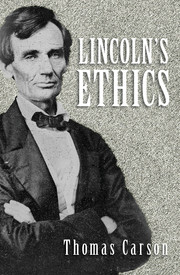Book contents
- Frontmatter
- Dedication
- Epigraph
- Contents
- Detailed Contents
- List of Maps and Figures
- Acknowledgments
- How This Book Came to Be
- 1 Introduction
- PART ONE LINCOLN THE POLITICIAN AND COMMANDER IN CHIEF
- PART TWO LINCOLN'S MORAL CHARACTER
- 7 Lincoln's Virtues
- 8 Other Salient Features of Lincoln's Character and Personality
- 9 Lincoln's Marriage and Family Life, and What They Reveal about His Character
- 10 Was Lincoln a Racist?
- 11 Conclusion
- Bibliography
- Index
- Plate Section
7 - Lincoln's Virtues
from PART TWO - LINCOLN'S MORAL CHARACTER
Published online by Cambridge University Press: 05 May 2015
- Frontmatter
- Dedication
- Epigraph
- Contents
- Detailed Contents
- List of Maps and Figures
- Acknowledgments
- How This Book Came to Be
- 1 Introduction
- PART ONE LINCOLN THE POLITICIAN AND COMMANDER IN CHIEF
- PART TWO LINCOLN'S MORAL CHARACTER
- 7 Lincoln's Virtues
- 8 Other Salient Features of Lincoln's Character and Personality
- 9 Lincoln's Marriage and Family Life, and What They Reveal about His Character
- 10 Was Lincoln a Racist?
- 11 Conclusion
- Bibliography
- Index
- Plate Section
Summary
Lincoln possessed many important moral virtues. He possessed some of these virtues to a very high degree, but he might have lacked other virtues.
I. Some Important Moral Virtues that Lincoln Possessed to a High/Very High Degree
1. Lincoln was an unusually kind, benevolent, compassionate, and tender-hearted person in both his feelings and actions. He was deeply moved and distressed by human and animal suffering. His kindness was a virtue, and it was the foundation of his opposition to slavery. This trait was very pronounced from his childhood on and was observed by many people on many occasions.
He was exceptionally kind to animals. His stepsister recalled that “he once preached a youthful sermon defending the right to life of ants.” As a ten-year-old boy he upbraided his companions for putting hot coals on the backs of turtles. Once he went to great trouble to rescue a hog from drowning in the mud. He plunged barefoot into a cold icy swamp to rescue his dog during the bitterly cold winter of 1830 when he and his family were moving from Indiana to Illinois. In 1855, while traveling in a buggy, he heard the loud squealing of a small pig. He leapt out and drove off an old sow who was eating one of her young. His very close friend Joshua Speed recalled that while riding on horseback through the woods with a number of other men Lincoln fell behind, and the others wondered why. Here is Speed's account as recorded by Herndon:
After waiting for some time Hardin came up and we asked him where Lincoln was. “Oh,” said he, “when I saw him last” (there had been a severe wind storm), “he had caught two little birds in his hand, which the wind had blown from their nest, and he was hunting for the nest” …He finally found the nest, and placed the birds, to use his own words, “in the home provided for them by their mother.”
- Type
- Chapter
- Information
- Lincoln's Ethics , pp. 231 - 279Publisher: Cambridge University PressPrint publication year: 2015

